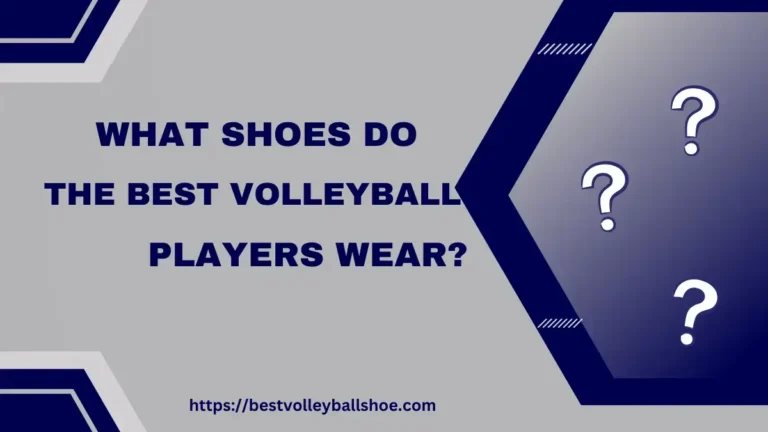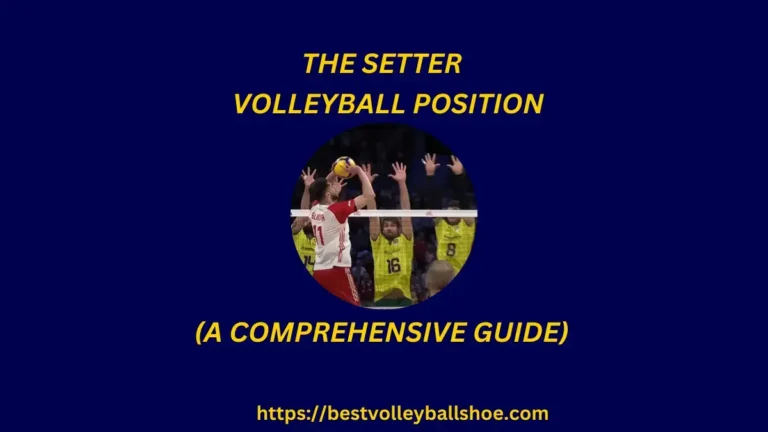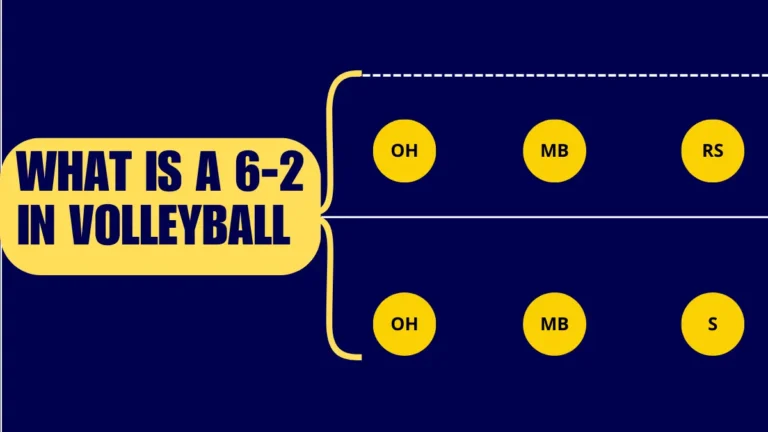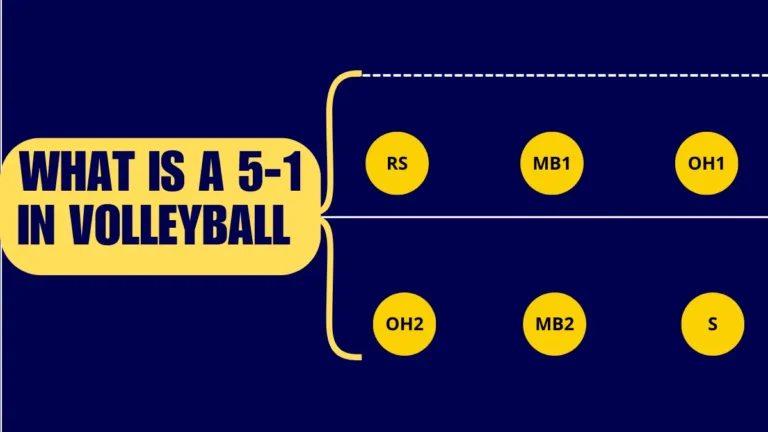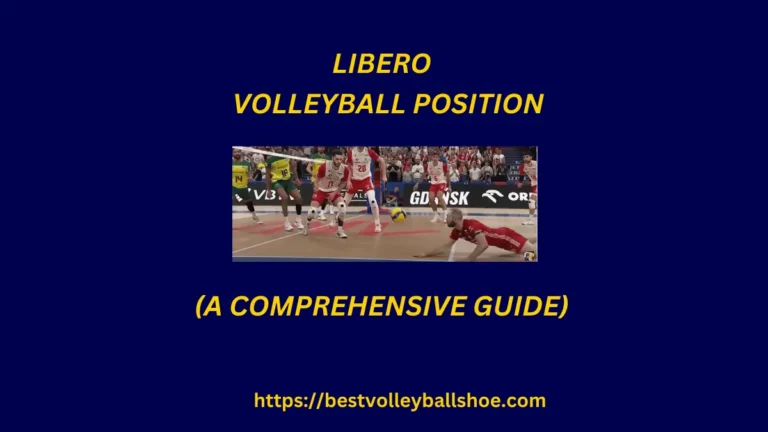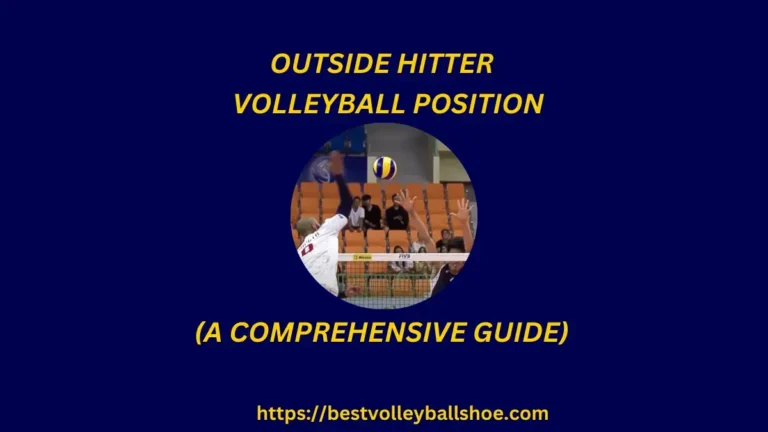Defensive Specialist Volleyball Position: A Comprehensive Guide
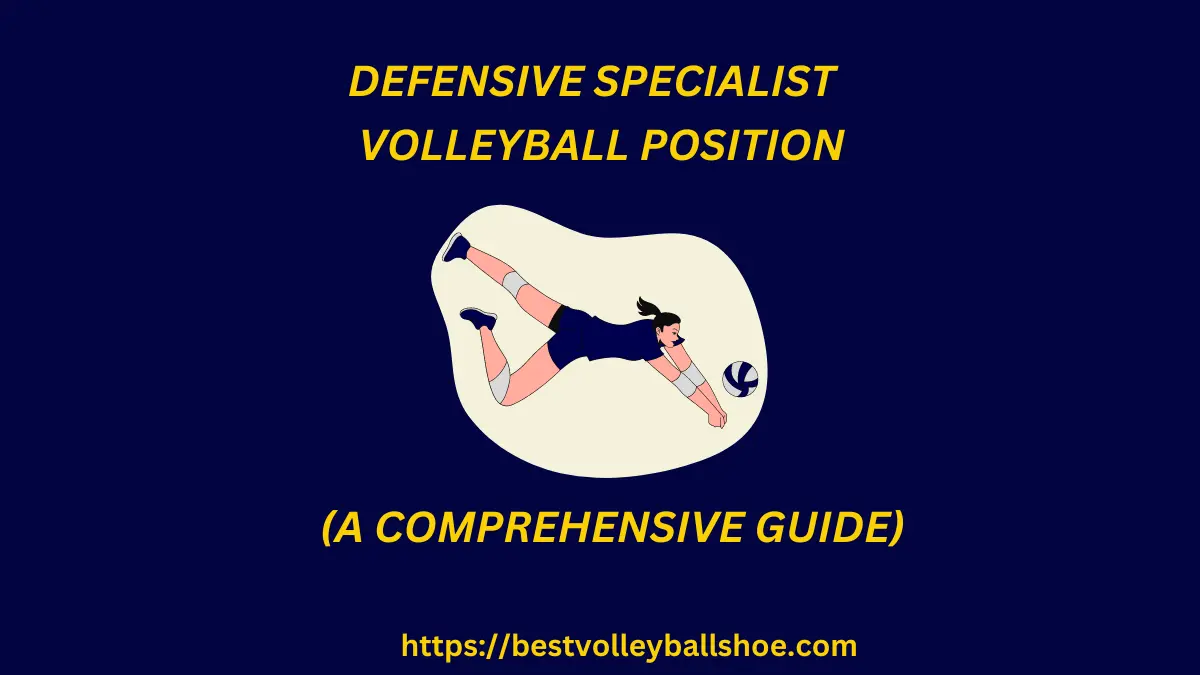
Defensive specialist volleyball (DS) is a unique defense-specific position in the back row of the court.
It is not included in the list of 05 base positions and is less common in volleyball matches.
However, they may come to court as per need and requirement.
What is a Defensive Specialist Volleyball?
A defensive specialist volleyball is a player with expertise in digging and passing. They are commonly used as specialized substitutions, especially in the back row, to strengthen a team’s defensive capabilities and passing accuracy.
They can be any volleyball player, i.e., an outside hitter, an opposite hitter, or a middle blocker.
When DS Comes to the Court?
They usually come to the court to
Volleyball Terms for Defensive Specialist
Other terms are used in volleyball commentary, analysis, and media coverage. These terms are mainly used to describe the role, impact, and understanding of liberos skills and importance.
Historical Background
Although no official or documented evidence is available about this position, it is presumed that it was introduced with the libero position in volleyball.
The main reason for including this position was to aid the libero and strengthen the defense.
Including a defensive specialist seems logical, as there is more than one player at other volleyball positions like two hitters i.e. opposite hitter is there to help outside in offense as well as middle blockers in defense in the Front Row.
Rules for Defensive Specialist Volleyball
Defensive Specialist Volleyball vs. Libero Volleyball
Suppose the defensive specialist volleyball position has the same role as the libero volleyball position. How is it different from libero?
I would like you to see the table below for a better understanding
| Aspect | Libero | Defensive Specialist |
|---|---|---|
| Position | Specific position on the team | Not a specific position |
| Jersey Color | Wears a different-colored jersey | Wears the same team jersey |
| Substitution | Unique substitution privileges | Follows standard substitution rules |
| Defensive Focus | Primarily focused on defense | Specializes in defense within their regular position |
| Setting and Attacking | Typically not involved in setting or attacking | May participate in setting, attacking, and blocking if their primary position allows |
| Back-Row Service | Not allowed to serve except US | Can serve according to regular serving rules |
| Blocking | Not allowed to participate in blocking actions | May participate in blocking if their primary position allows |
| Number of Substitutions | Unlimited, as long as they enter and exit for the same player position | Counts towards the team’s total substitutions and substitutions are typically planned in advance |
Role of the Defensive Specialist Volleyball?
A defensive specialist (DS) in volleyball primarily focuses on enhancing the team’s defensive capabilities and ensuring solid ball control in the backcourt. Here are the key responsibilities and roles of a defensive specialist:
1. Passing and Serve Reception
DS players are exceptional at passing and serve reception. They work diligently to receive serves from the opponent accurately, ensuring the ball is in play. It can be effectively set up for an attack.
2. Digging
DS players excel in digging, which involves diving or using their hands/forearms to retrieve and control the opponent’s attacks. Their quick reflexes and precise ball control help extend rallies and prevent the ball from hitting the floor.
3. Backcourt Defense
They cover a significant portion of the court in the back row, making sure to be in the right position to defend against opponent’s attacks.
It requires excellent court awareness and anticipating where the ball will go.
DS players often enter the game during specific rotations, typically replacing a front-row player when they rotate to the back row.
They need to integrate into the team’s defensive strategy seamlessly.
4. Communication
Effective communication is crucial for DS players. They must coordinate with teammates to avoid overlapping responsibilities and ensure everyone is positioned optimally for defensive plays.
5. Serve Opportunities
DS players also serve when they enter the game if the player they’re substituting for has yet to serve in that rotation. Their serves must be accurate and consistent to apply pressure on the opponent.
6. Back-Row Attacks
DS players can jump and hit the ball from behind the 10-foot line in the back row, contributing to offensive plays if necessary.
Conclusively, the defensive specialist’s role is vital for maintaining ball control, extending rallies, and providing a strong defensive foundation for the team.
They are known for their exceptional defensive skills and are crucial to a volleyball team’s success.
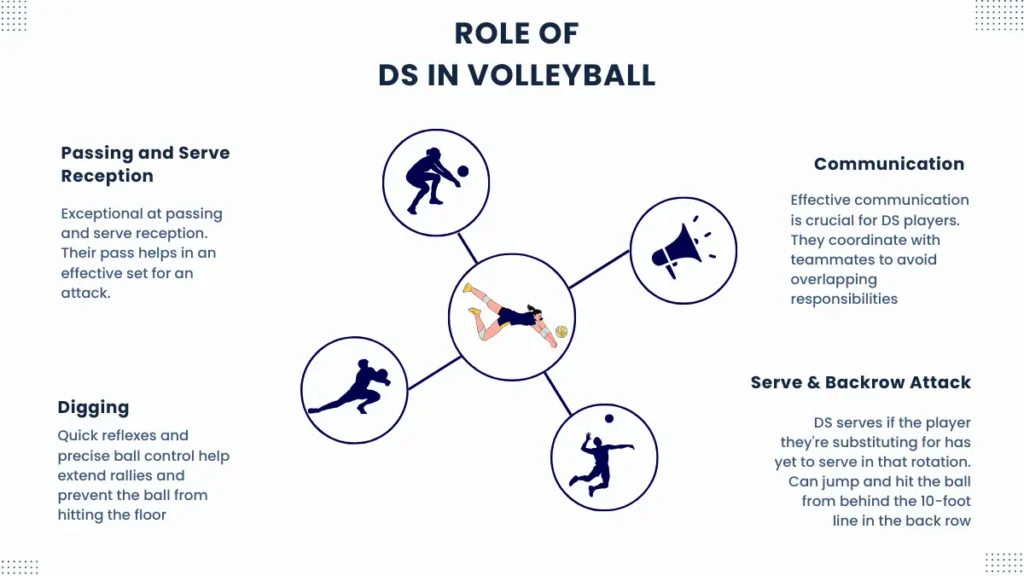
Importance of the Defensive Specialist Volleyball
Defensive specialist volleyball is a defense augmenter. For instance, according to a study, 71% of the total spikes are aimed at the back row of the court i.e. at the defensive positions.
In other words, your blockers can only stop approx. 30% of the spikes if all of their blocking attempts are successful. On the other hand, the defense has to face 70% of the attacks which is 2/3 rd of the total.
So, logically you are in need of someone who is a real defensive specialist. However, this is another question whether a team requires a dedicated player to be a defensive specialist or not.
The answer to this question is No. Because today’s volleyball game is more focused and inclined toward offense rather than defense. So any player with decent digging and passing skills can act as a defensive specialist.
In my opinion, it is wiser to have a hitter with good digging and passing skills as a defensive specialist rather than a dedicated player for this purpose.
Qualities & Strengths of the Defensive Specialist Volleyball
1. Speed and Explosiveness
Great DS are like the Usain Bolt of the volleyball court. It’s like they’ve got a secret turbo mode that they activate to cover ground faster than you, the “spike” from the opponent hitter.
When that ball is up in the air, they’re already on their way, moving with a speed that makes us wonder if they’ve got a pair of rocket boosters hidden in their shoes.
It’s not just about getting there; it’s about getting there before anyone even realizes the ball is in play.
2. Exceptional Passing and Digging
Passing and digging are the two basic requirements of this position. The great defensive specialists are simply outstanding in these skills.
Imagine! You are in a do-or-die match, and the opponent hitters are spiking excellently. In this situation, a defensive specialist in the back row to aid the libero is like a sigh of hope.
They are in the back row to receive every serve and pass it to the setter perfectly and accurately.
When digging, they dive, roll, and stretch to save that ball from hitting the floor.
3. Pressure Handling
A must characteristic of a defensive specialist is performing under pressure. It is the prime requirement of this position.
DS comes into the court in an extremely pressured situation when every serve is to be properly received, and kill is required to dig.
Great defensive specialists are best at handling and performing under pressure.
4. Back Row hitting
Although the prime purpose of the DS is passing and digging, the powerful hitting ability of the DS from the Back Row is a bonus for the team.
Physical Attributes of Defensive Specialist
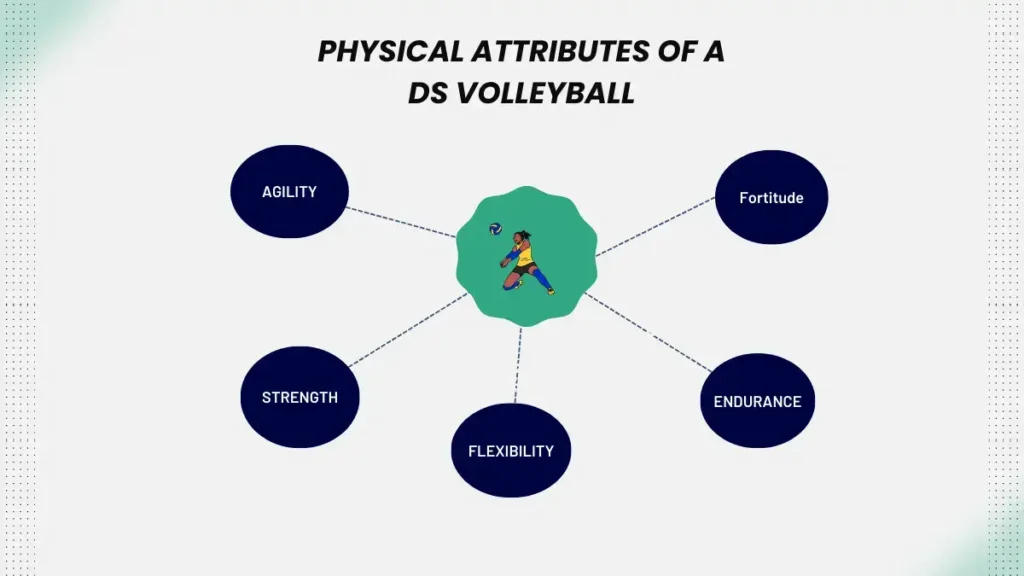
Is Defensive Specialist a Good Position to Play In Volleyball?
First and foremost, the defensive specialist isn’t regarded as a primary position by several volleyball experts. It is the expertise of a volleyball player playing at any position in addition to his responsibilities.
Nonetheless, the role of this position is equally exciting due to the responsibilities, expectations, and time of entry into the court.
There are a few checklists and other aspects to remember while deciding this.
Firstly, what is your interest if you like to challenge the spiker who powerfully hits the ball into the opponent’s side of the court, and you enjoy the movement of frustration after digging his hit?
Then, of course! It would be best if you opted for this position.
If you can sustain the pressure that is mounted as a result of nail-biter competition
Essential Equipment for a Setter Position
How To Be A Better Defensive Specialist?
Every beginner in any walk of life has a desire to excel in their career, and the same is the case with a beginner volleyball libero. It is a very good sign that you want to become better.
I would like you to remember the qualities of a best defensive specialist at the start of this article and the tips for becoming a better libero.
However, I am also writing a detailed article on tips and tricks for improving defensive skills. The same skills will be applied to this position
1. Improve your Passing and Digging
These two skills are your foundation – like the bread and butter of an exceptional defensive specialist. These skills will be with you throughout your career as a volleyball defensive specialist.
Regarding passing, I’m talking about getting that ball to your setter with pinpoint precision. You want to create a solid platform with your forearms by clasping your hands together, forming a flat surface.
The ball should hit this platform and bounce off smoothly towards your setter. Practice makes perfect here, so spend more time working on your passing until it becomes second nature.
And then there’s digging – the art of getting under those spiked balls and sending them back into play. You should watch the hitter’s approach closely and make a split-second decision on where to position yourself.
That’s when your quick reflexes kick in – dive, roll, or slide – do whatever it takes to pop that ball back up and keep the rally alive.
2. Develop Agility strength and explosiveness
As I have described earlier, the great DS is so fast, as they’ve got a secret turbo mode that they activate to cover ground faster than you can say “spike! So you have to develop this turbo mode.
The merciless spike from the opponent hitter does not allow you to become lazy. You have to decide and act in a split second. The only way to accomplish this uphill task is to develop Agility and explosiveness.
Notably, you should be strong in your lower body to do sprints and dives.
3. Practice Makes a Man Perfect:
I want you to remember the above sentence. A coach or a mentor can teach you the technique, but he can’t bring your skill to perfection.
It’s only you who have to work hard to let it happen through your dedication and hard work.
Defensive Specialist FAQ
What does DS stand for in volleyball?
DS is the abbreviation of Defensive Specialist- a volleyball player with excellent passing and digging skills who subs in the team to boost the defensive abilities of a team.
What’s the average size/height of a defensive specialist?
The average height of the defensive specialist is the same as that of their primary position. If an outside hitter is good at defense, he can be a defensive specialist. So, the height requirement will primarily depend on their primary role.
Is a defensive specialist a blocker in volleyball?
Yes, he can be a blocker because they are defense specialists. Once again, I will quote the same reason: their primary role. For instance, if an outside hitter is good at defense, he can be a defensive specialist.
Hence, he is a blocker in the Front Row.
However, in most instances, they are at the back row to pass and dig
How many defensive specialists are there in volleyball?
Normally, there is one DS in a team, but there is also no restriction on having more than one DS.
